
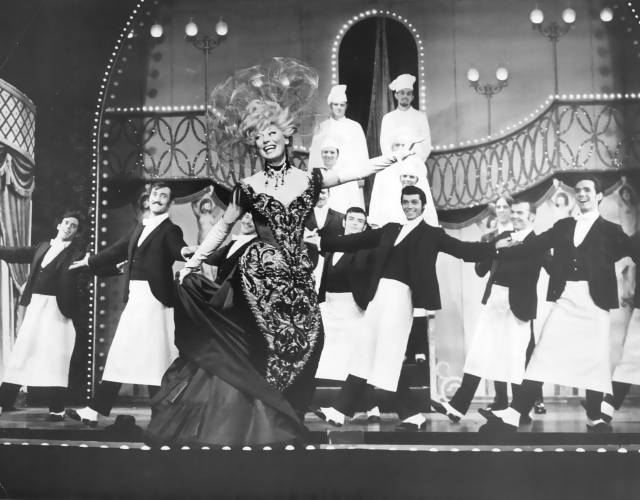
According to The Broadway League, since 1984 there have been between 28 to 46 new shows on Broadway each season, which is why it’s astounding to realize that between June 1,1963 and May 31,1964, a whopping 68 new productions made their Broadway debut. This astonishing season featured stars like Richard Burton, Alec Guinness, Mary Martin, Christopher Plummer, Kirk Douglas, Albert Finney, Julie Harris, and Tallulah Bankhead and saw divas Barbra Streisand and Carol Channing give legendary performances in Funny Girl and Hello, Dolly! respectively. Rightfully labeled as a season “never to be forgotten” by Peter Filichia in his new book The Great Parade, this year would also feature works by Neil Simon, and Stephen Sondheim, who in Anyone Can Whistle had his first flop in years but gave Angela Lansbury her first Broadway role, and we know how their future collaborations would turn out.
Mr. Filichia’s book is filled with trivia that makes it quite an addictive read, but he also adds his usual thought-provoking insights by mentioning “coulda been” casting, and contrasting what Broadway was like then and how much it has changed since (there used to be cast recordings of plays!) We had the opportunity to talk to Mr. Filichia about the inspiration behind The Great Parade, the iconic characters of the 1963-64 season and what shows he would like to see revived.
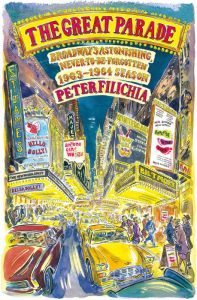 When did you realize you had the material for a great book based on the '63-64 season?
When did you realize you had the material for a great book based on the '63-64 season?
The truth is that the original idea for the book I proposed to my editor was taking a look at Broadway 50 years ago and comparing it to now, so we started talking and I mentioned all the people who were involved that season: Mary Martin, Robert Preston, Alec Guinness, Richard Burton, Paul Newman, Joanne Woodward, Barbra Streisand, Carol Burnett, Helen Hayes, Bert Lahr, Angela Lansbury...there were so many of them that he said “you know, why don’t you just write a book on that season? I think that would really be fine, you can make comparisons here and there, but that sounds like such an amazing year that I think you should concentrate on this season.”
What were some of the discoveries that surprised you the most when you were doing your research?
The most fascinating thing was that The Subject Was Roses, which would end up winning a Tony for Best Play and a Pulitzer Prize, opened on May 25, but on March 12, just 74 days earlier, it didn’t even have a producer. Think of that happening today! For example Doctor Zhivago took 14 years to get here, It Shoulda Been You I saw in New Jersey four years ago, things take so long today to get done, that it’s flabbergasting to think that this happened in 74 days. Similarly speaking in those days there was only one producer above the title, maybe two, and in a play called Any Wednesday there were five producers, and when The New Yorker listed them they added in parenthesis “have we got them all?”, meaning it was so astonishing to have five producers in one property that they had to remark on it because that just was unheard of. Today of course if five producers made a play there would be an article about how great their accomplishment is, even musicals nowadays have more producers than there are people in the cast. In those days it took $80 thousand to get on a play, as opposed to the millions it takes today, and about $400 thousand for a musical, as opposed to the multi-millions it’d take today. I remember meeting a woman who in 1956 when My Fair Lady opened, was so upset because she paid $25 to get her ticket from a scalper, and she was furious all through the show because she had paid three times the price of the ticket. As the years have gone I wonder if she went “you know $25 to see Julie Andrews, Rex Harrison in My Fair Lady when it was fresh...yeah I was lucky and I didn’t know it”.
Did you talk to anyone involved in any of the projects of the '63-64 season who had changed their minds about what they once thought of certain shows?
The sad thing is that the 50 years that have passed by mean that by now most of the people are dead, I mean Harold Prince is still around but ironically he didn’t have a show that season. It was pretty much dominated by David Merrick who’s been dead for about 15 years, so there were very few people to talk to. I did talk to people who invested in shows, but basically since I was around back then, even though I was really young, the fact is that I was able to see a lot of these shows. I lived in Boston which was a big tryout town, I saw Funny Girl, Hamlet with Richard Burton, and plenty of others too. A lot of what I wrote represents my perception of then and now. People’s tastes change when they get older, they might scorn things they liked when they were younger and I’m no exception to the rule.
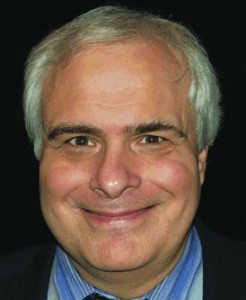
Many people nowadays complain that most Broadway shows are movie adaptations, but even back then we see that they made a musical out of something like Miracle on 34th Street...
Yeah, it was pretty rare to have that happen and it was even considered innovative, I did a talkback at Musicals Tonight, they did the musical Hazel Flag, which had been based on a 1937 movie called Nothing Sacred and I pointed out this was the first time that a movie was adapted. So back then movies were just starting to become Broadway shows, but here’s what’s interesting about that, notice that the musical was not called Miracle on 34th Street: The Musical it was called Here’s Love because in those days the feeling was you did not use the original title of a property because you wanted to prove that you were something brand new and exciting. Today of course they use the title to help sell tickets, but in those days it was a very different mindset. The irony is that if you wanted to put on that very show today in your community theatre or high school, when you get the materials from Music Theatre International, the company who licenses the show, you are actually producing Miracle on 34th Street: The Musical; they changed the title because they know more people will come to see that than they will go see Here’s Love. Similarly speaking in the 1970s there was a musical of Some Like It Hot which was called Sugar because that’s what the name of the character that Marilyn Monroe played in the movie; if you wanna license it today you’d be buying Some Like It Hot.
Do you think this is one of the reasons why Bob Merrill’s musical version of Breakfast at Tiffany’s failed?
Breakfast at Tiffany’s was the most anticipated show of the season and when there are very high expectations for a show they will easily be dashed even if it’s just slightly mediocre, and while this of course happened a few years after the season I wrote about, it’s an interesting case because it was a well known property, it had the biggest advance of the year and it starred Mary Tyler Moore who had just won multiple Emmys on The Dick Van Dyke Show and Richard Chamberlain who was a real heartthrob, Merrill had just done Funny Girl and had done other things on Broadway which had done decently, I don’t think he’d done anything that’d run for less than a year, which in those days was considered a very long run. The director and adapter was Abe Burrows whose last show had been How to Succeed in Business Without Really Trying so this had to be a smash hit, I still remember I saw it when it was trying out in Boston and at that point it was the worst musical I’d ever seen in my life. Even though it had a big advance it was amazing that David Merrick actually said “this show stinks, I’m giving back the money that people sent in”. Back then this meant they had to mail people back their checks, which is how they bought their tickets. It’s a little easier now but it’s more expensive because part of that expense goes to the credit card companies which charge anywhere from four to seven percent on your ticket price, so the producers go “oh sure, we’ll take that!” Even theaters charge restoration fees, that’s the price of doing business, you don’t go into a restaurant and they charge you an extra buck because they need to keep the place looking nice. Theaters are the only business where we have to pay something like that and I think it’s pretty lousy.
Discussing What Makes Sammy Run you mention the influence Gypsy would have in all serious musicals after it came out. You wrote extensively about Gypsy in your previous book, would you say that by 1964 people were already looking back and thinking how much they had mistreated it at the Tonys?
I don’t think that, I think they basically thought that “Rose’s Turn” was a great idea. That having a character go through an epiphany like that and having all these songs jumble together and all that type thing was a very appealing thing. It was the same with Oklahoma, after it opened with a dream ballet, suddenly every musical of the '40s had to have a dream ballet. Imitation really does happen, once someone starts something, imitation really is the most sincere form of flattery, people want to replicate great ideas. Jule Styne's very next musical after Gypsy, Do Re Mi, had the same type of thing at the end of the show. It’s not as significant anymore but at the time it was a fad.
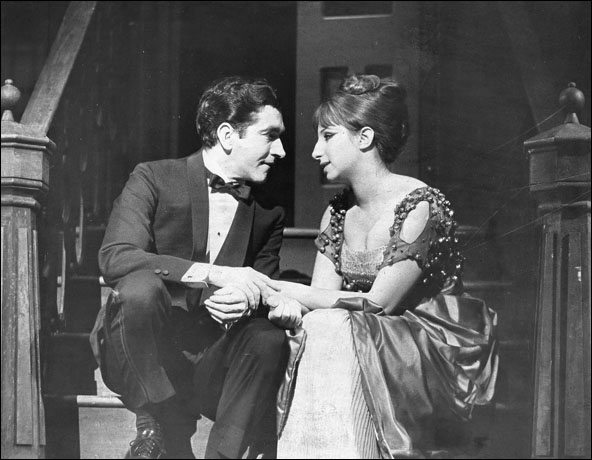
Also, at that time the Tonys weren’t even that important right?
They really weren’t, you look at pictures of marquees from way back when and you see “Pulitzer Prize Winner”, “New York Critics Circle Award”, that type of thing and they don’t even mention the Tonys. The one that really did it was Cabaret which was the very first musical to win Best Musical on national TV. The Tonys went on TV in 1967, so as a result because people were watching them on TV they became a big deal, and there’s no question, nowadays if you have any kind of visibility on the Tonys people will start calling the next day to buy tickets. Back then they took place at the Waldorf Astoria ballroom and they were televised in New York only, and usually they were done on Sundays because there were no shows on Sunday because it was the Lord’s day, now of course it’s a day to make more money because people have nothing to do on Sunday because they’re not going to church anyway.
I find it beautiful in a strange way to realize that Angela Lansbury did Anyone Can Whistle that season and Beatrice Lillie was nominated for the Tony that year for playing Madame Arcati in High Spirits, and more than forty years later Angela Lansbury would win her fifth Tony for the same part in Blithe Spirit. What characters from this season, other than Dolly and Fanny Brice, would you say became awards magnets for the actors who play them?
That’s a very good question, I have to admit that this season didn’t have that much staying power in terms of dynamic roles that people play day in and day out. Ironically enough the ones that seem to have gained a life after the fact are the ones that weren’t that successful during that period, the one I’m thinking of is 110 in the Shade, a show that I really believe was subverted by its title, which I think is not a good title, but it’s lasted because a lot of women want to play Lizzie, a spinster who believes she is never going to get married and by the end of the show there are two guys fighting for her attention. Madame Arcati of course is a wonderful role, but people tend to play her in Blithe Spirit rather than High Spirits, which is shame because it was a really good musical. But there weren’t many lasting parts to make actors say “I wanna sink my teeth into”. That season Sandy Dennis won the Best Actress Tony for a comedy called Any Wednesday which lasted two years, and that was good enough then to make it one of the longest running comedies of all time, but the thing is, so many of these comedies have paled because a lot of them dealt with sexual issues and the thing is that TV has taken over that now, especially cable TV where we hear about things we didn’t hear about. In those days if you wanted to see anything about sex you had to go to Broadway, it wasn’t on TV and it was barely in the movies, so those plays were considered salacious. This one’s about a mistress being kept by a man who is cheating on his wife, so even though Sandy Dennis won the Tony because the part is really good, the play itself isn’t really revivable, so nobody really does it.
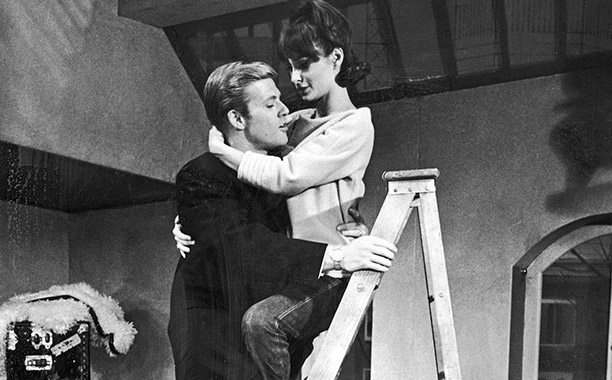
Robert Redford did Barefoot in the Park that year, which began a tradition of awards bodies snubbing his acting work. Do you think this has anything to do with how effortless he makes everything look?
Here he was in a comedy as well, but it was his co-star Elizabeth Ashley who was nominated, and it really was her play. Redford is quoted in William Goldman’s The Season and when I met him three years after the book was published and asked him why didn’t he come back to Broadway he gave me the exact same explanation, which either means it’s really what he said to Goldman or he read the book, liked it and thought it was a good answer, anyway, he said “all the plays I’m offered are the girl’s plays, they have all the great lines and at the end I’m just supposed to stand there with my hat in my hand and say ‘you’re wild and crazy and unpredictable and I love you’, they’re all like that because people wanna see the funky girl”. It’s always the girl who gets to be madcap and little off the wall, men especially in those days were supposed to be serious, go to work and get ahead, while women staying at home could afford to do strange things. What’s interesting about Barefoot in the Park is that the girl doesn’t work, it’s never established if she’s even going to work some day. What does she do all day? She’s not tending to her kids either, she makes the apartment look nice, but what does she do all day as the guy is out working on becoming a lawyer? He’s the one with the problems but that gives her enough time to be delightful and wacky and for him to fall in love with her.
Considering this I’m surprised they didn’t ask Redford to play Captain von Trapp in The Sound of Music.
What an interesting idea, frankly if he had been a little younger he would’ve been good for Rolfe because he has the looks. But yeah, it’s true, especially in musicals the characters that tend to get most of the attention are the women, I mean Mary Martin, Ethel Merman, Angela Lansbury, Patti Lupone, Bernadette Peters...we talk about them more than we talk about the male stars. Who are the male stars? Occasionally we talk about Robert Preston, Richard Kiley every now and then, but not with the devotion that we talk about the female stars, so as a result most of the time it really is about the women.
Which of the shows of this season would you most like to see revived?
I would like to see Luther, which won Best Play, get another chance, simply because it was the Best Play, it would be interesting to see if indeed it would hold up at all. Similarly speaking another one that was very popular only that year was The Deputy, which was about the Pope not taking action when Hitler was exterminating the Jews. This was a real cause célèbre back then, in fact like I mention in the book there was even a book about The Deputy that came out that same year called The Storm Over The Deputy. The play was originally nine hours long and they cut it down tremendously for Broadway, but I would like to see it to see if it has any worth whatsoever. At the time it was very controversial, but we don’t know if its popularity was fueled by the controversy or by the play itself.
The Great Parade is now available in stores.